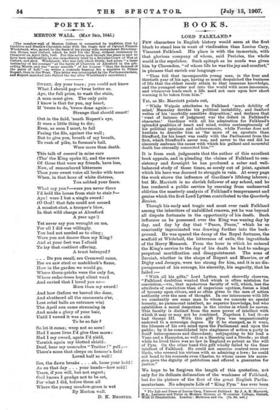PORTE, Y.
MERTON WALL. (MAY 3B,D, 1645.) I-The meadow-wall of Merton College is connected by tradition (but by tradition and Heath's Chronicle only) with the tragic fate of Colonel Francis Windebank, who, moved by the fears of his young wife, surrendered Blotching- don House, near Oxford, which he held for the Xing, without resistance to Cromwell on April 24th, 1645. For this action (and though the place is said to have been indefensible) he was immediately tried by a Royalist Court of War at Oxford, and shot. Windebank, who was only about thirty, had given " a large testimony of his courage" at the battle of Cheriton or Alresford in the pre- ceding Marsh, and was " more sensible " of his honour " than the damned of the pains of hell,"—so writes a comrade begging for a reprieve to Prince Rupert, then in the West. This letter was intercepted by the Parliamentarians, and Rupertmarched into Oxford the day after Windebank's execution.]
SWEET, dry your tears ; you could not know What I should pay—'twas better so.
Aye, the full price, to wash the stain, - A man must give. The only pain I know is that for you, my heart, If 'twere to do, 'twere done again :- Strange that should smart!
Out in the field, 'neath Rupert's eye, It were a little thing to die; Even, as soon I must, to fall Facing the file, against the wall ; But to give you, breath of my breath, To rush of pike, to foeman's ball, Were more than death.
This talk of coward in mine ears
(Tho' the King spoke it), and the sneers Of those that were my friends, have less, Now, of remembered bitterness Than your sweet voice all broke with tears When, in that hour of white distress, You sobbed your fears.
What say you P—were you never there I'd held the house from stair to stair ?— Aye! were I but a single sword !
(0 God! that fate could not accord A musket-shot, a trooper's blow, In that wild charge at Alresford A year ago !) Yet never say you wrought on me, For all I did was willingly.
You had not needed so to cling ; Were you not dearer than my King ? And at your feet was I afraid To lay that costliest offering, A trust betrayed ?
. . . Do you recall, ere Cromwell came, Ere we saw steel or matchlock's flame, How in the garden we would go, Where thorn-pricks were the only foe, Where cedar-trees kept silent ward And envied that I loved you so—
More than my sword !
And how (before we barred the door, And shuttered all the casements o'er, Lest rebel balls an entrance win) The April sun came streaming in And made a glory of your hair, "Until I vowed it was a sin To be so fair ?
So let it come; weep not so sore!
Had I more lives I'd give thee more : Had I my sword, again I'd yield, Tarnish again my blotted shield : Deaf, hear my comrades " Traitor !" yell ;- There's none that sleeps on honour's field Loved half so well !
See, the dawn breaks . . . ah, loose your hold !
As on that day . . . your hands—how cold!
Tears, if you will, but not regret; God knows I grudge not to be set, For what I did, before them all Where the young meadow-grass is wet By Merton wall.
D. K. BROSTER.






































 Previous page
Previous page